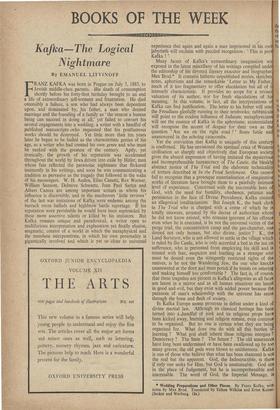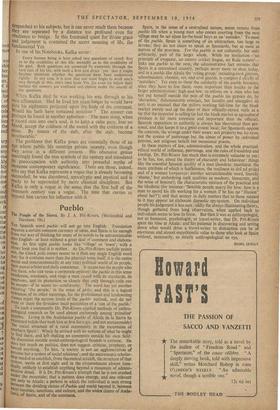Kafka— The Logical Nightmare
By EMANUEL LITVINOFF FRANZ KAFKA was born in Prague on July 3, 1883, to Jewish middle-class parents. His death of consumption shortly before his forty-first birthday brought to an end a life of extraordinary self-torment and frustration. He died ostensibly a failure, a son who had always been dependent upon, and dominated by, his father, a man who desired marriage and the founding of a family as 'the utmost a human being can succeed in doing at all,' yet failed to convert his several engagements into a wedding; a writer with a handful of published manuscripts .who requested that his posthumous works should , be destroyed. Yet little more than ten years later he began to be hailed as the characteristic genius of his age, as a writer who had created his own genre and who must be ranked with the greatest of the century. Aptly, yet Ironically, the growth of his reputation was accelerated throughout the world by Jews. driven into exile by Hitler, men whose fate reflected the paranoiac nightmare that flickered insistently in his writings, and soon he was communicating a tradition as pervasive as the tragedy that followed in the wake of his messengers. W. H. Auden, Elias Canetti, Rex Warner, William Sansom, Delmore Schwartz, Jean Paul Sartre and Albert Camus are among important writers in whom his influence is discernible, and in the mushroom 'little reviews' of the last war imitations of Kafka were endemic among the barrack room ballads and highbrow battle reportage. If his reputation were perishable he would have been superseded by these more assertive talents or killed by his imitators. But Kafka remains unique and paradoxical, a writer open to multifarious interpretation and explanation yet finally elusive, enigmatic; creator of a world in which the metaphysical and the mundane interpenetrate, in which his own personality is gigantically involved and which is yet so close to universal experience that again and again a man imprisoned nt7i hs ow labyrinth will exclaim with puzzled recognition : This is pur. Kafka Many facets of Kafka's extraordinary imagination ar exposed in the latest miscellany of his writings compiled unde the editorship of his devoted literary executor and biographer Max Brod.* It contains hitherto unpublished stories, sketches notes, aphorisms and the remarkable `Letter to My Father, much of it too fragmentary to offer elucidation but all of i intensely characteristic. It provides no scope for a revise valuation of its author, nor for fresh elucidations of hi meaning. In this volume, in fact, all the interpretations o Kafka can find justification. The letter to his father will send the Freudians gleefully running to their textbooks; rabbinical will point to the evident influence of Judaism; metaphysician will see the essence of Kafka in the aphorisms; existentialists will recognise the accent of despair for their own as the question 'Are we on the right road ? ' floats futile and unanswered in the echoing catacombs.
Yet the conviction that Kafka is uniquely of this century is confirmed. He has envisioned the spiritual crisis of Western civilisation so sharply and objectively that European society gives the absurd impression of having imitated the mysterious and incomprehensible bureaucracy of The Castle, the bleakly abstract justice of The Trial and the elaborate technicality of torture described in In the Penal Settlement. One cannot fail to recognise that a grotesque materialisation of imaginative works of literature have brought them to a painfully intimate level of experience. Concerned with the inscrutable laws of God, with the need for humility, obedience, patience and persistence in the face of Divine Providence, Kafka created an allegorical totalitarianism. But Joseph K., the bank clerk in The Trial who is charged with a crime of which he is totally unaware, arrested by the decree of authorities whom he did not know existed, who remains ignorant of his offence even when he is executed, is he not the universal victim of the purge trial, the concentration camp and the gas-chamber, one denied not only human, but also divine, justice ? K., the Land Surveyor, who is not allowed to settle in the village which is ruled by the Castle, who is only accorded a bed in the inn on sufferance, who is prevented from employing his skill and is treated with fear, suspicion and loathing as a stranger who must be denied even the stringently restricted rights of the natives, is he not the Wandering Jew, the one who knocks unanswered at the door and must perish if he insists on entering and making himself too comfortable ? The fact is, of course. that these tragedies are present in Kafka's allegories as all faces are latent in a mirror and as all human situations are latent in good and evil, but they exist with added power because the paranoia of man's relationship with the universe has eaten through the bone and flesh of society. In Kafka Europe seems prostrate in defeat under a kind of divine martial law. Although its classical heritage has been turned into a ,,,handful of junk and its religious props have been kicked away, learning and religion remain, even continue to be organised. But no one is certain what they are being organised for. What does one do with all this burden of learning ? What god shall inherit these religious energies ? Democracy ? The State ? The future ? The old assurances have long been undermined or have been swallowed up by too many graves; the old gods were blown to smithereens. Kafka is one of those who believe that what has been shattered is not the real but the apparent. God, the Indestructible, is there if only one seeks for Him, but God is unattainable. God sits in the place of Judgement, but he is incomprehensible and inscrutable. The word of God, the Imperial Message, is • Wedding Preparations. and Other Pieces. By Franz Kafka, witb notes by Max Brod. Translated by Eithno Wilkins and Ernst Kaiser. (Seeker and Warburg. 18s.) despatched to his subjects, but it can never reach them because they are separated by a distance too profound even for Obedience to bridge. In this frustrated quest for -divine grace and judgement is contained the secret meaning of life, the fundamental Yes.
In one of his Notebooks, Kafka wrote :
Every human being is here asked two questions of creed: first is to the credibility of this life, secondly as to the credibility of his goal. Both questions are answered by everyone, through the very fact of his life, with such a firm and direct yes' that it might become uncertain whether the questions have been understood rightly In any case, it is now that one must begin to work one's way through to this, one's own basic Yes, for even far below their surface the answers are confused and elusive under the assault of the questions.
When Kafka died he was working his way through to his OW II affirmation. Had he lived ten years longer he would have.
seen his nightmare projected upon the body of the continent. Would his faith have remained inviolate ? The answer can Perhaps be found in another aphorism : 'The main thing, when a sword cuts into one's soul, is to keep a calm gaze, lose no blood, accept the coldness of the sword with the coldness of a stone. By means of the stab, after the stab, become invulnerable.'
The problems that Kafka poses arc essentially those of an age where public life outstrips private insanity, even though they arose in a different• context. His obsessive genius unerringly found the true symbols of the century and translated its preoccupation with authority into powerful myths of immense contemporary significance. There are those, indeed, Who say that Kafka represents a vogue that is already becoming outmoded; he was disordered, apocalyptic and mystical and is ready to be superseded by more classical disciplines. But Xafka is only a vogue in the sense that the first half of the twentieth century was a vogue. The time that carries us beyond him carries his influence with it.



































 Previous page
Previous page